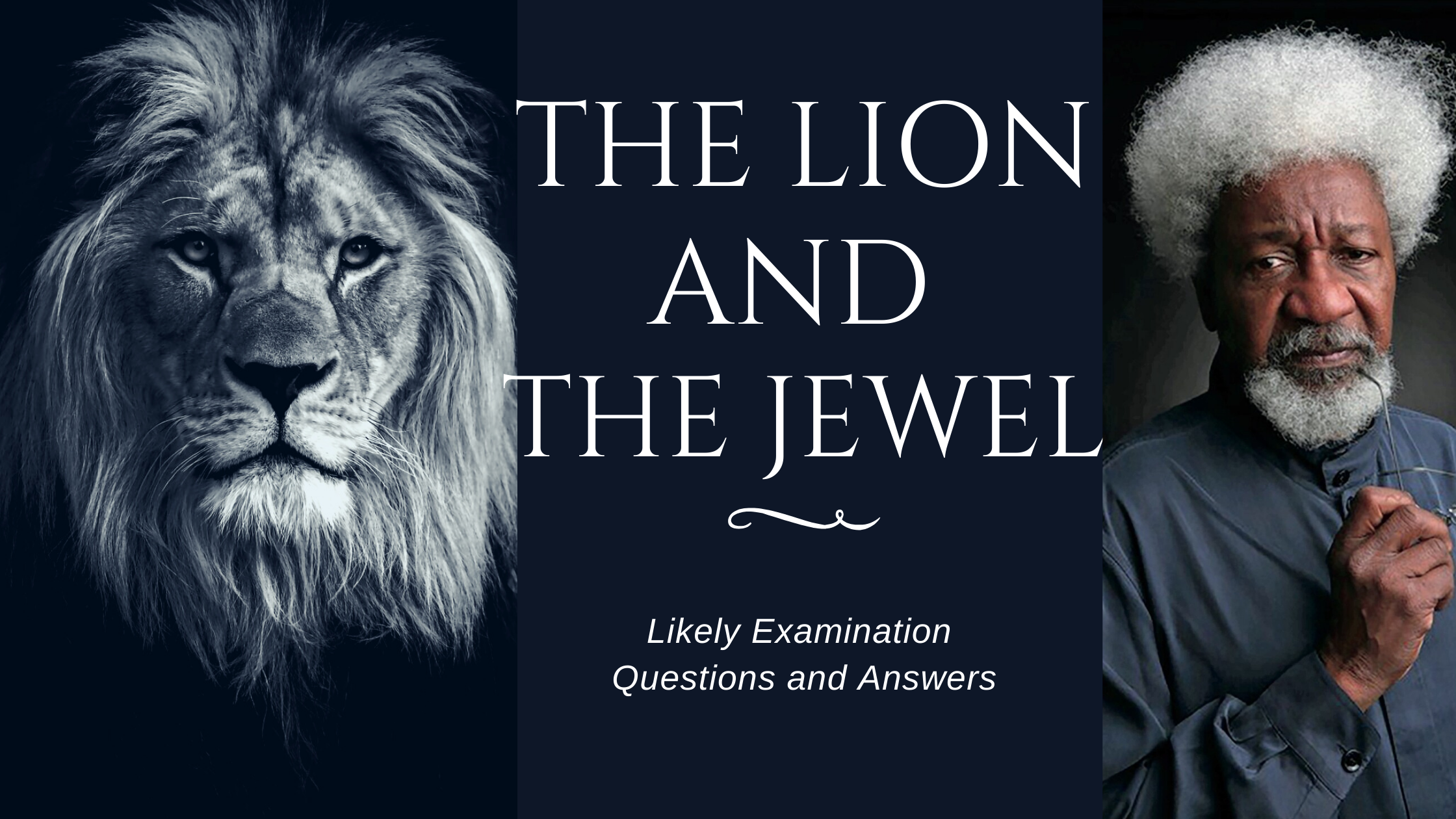In this post, we will be discussing the most likely examination questions and answers in The Lion and the Jewel you’ve been waiting for. Today, finally, you can have your essay questions on The Lion and the Jewel by Wole Soyinka, the renowned Nigerian playwright and Nobel Laureate of Literature, 1986.
Look out for possible objective questions on The Lion and the Jewel on this site.
Whether you’re a teacher or student of Literature looking for sample WAEC questions on The Lion and the Jewel, I can assure you that you will find the most probable questions on Wole Soyinka’s play, The Lion and the Jewel to help you make the right preparations for the WASSCE, WAEC, NECO, SSCE, GCE, JAMB test paper.
I will urge you to write essays on as many of these possible questions on The Lion and the Jewel as you can. And do not forget to write one essay on question #30.
Questions: Did Baroka have an affair with Sidi?
Answer: Yes. The evidence shows that she leant upon Baroka’s shoulders. Another proof could be that Lankule was content to no longer be being required to pay the wedding cost for Sidi. In the knowledge that Sidi was no longer virgin, he took advantage of this opportunity. The man isn’t obliged to pay bride’s price to a girl who’s not an actual virgin.
Lankule says to her “Dear Sidi, we shall forget the past. This great misfortune touches not the treasury of my love. But you will agree, it is only fair that we forget the bride-price totally since you no longer can be called a maid.”
Questions: What is the significance of the bride price In The Lion and Jewel?
Answer Lankule would like to get married to Sidi without having to pay the bride’s price. But, Sidi said that she will not accept becoming an unpopular figure in the community where she was married without cost of the dowry because she was not an unmarried woman.
In the drama, the playwright has explained the reasons for why the price paid by the bride is highly valued in the community. The bride whose price is paid is evidence that she’s an unmarried woman. The significance of the price of the bride for Illunjire community is that it will indicate that the girl is a virgin. She isn’t soiled, deflowered or defiled.
Question: What is the significance of marriage in the play “The Lion and the Jewel”?
Answer In the play, Lankule is a symbol of western and modernity, while Baroka represents the traditional way of living. When Sidi agrees to marry to Baroka this signifies the traditional way of life is more valued than contemporary culture. Through the play, the playwright demonstrates that even though modernity is a reality in villages like Illunjire village, the inhabitants aren’t averse to the modern lifestyle and prefer their traditions.
Another aspect to take into consideration is by tying the knot, Baroka not only asserts his power as a powerful man (chief) however, he also shows that older men are more knowledgeable than women and younger men. Baroka was able to stifle Sidi’s growing popularity. Baroka felt that Sidi was undermining his influence within the village. Being a skilled person, he was able to fulfill his goal of stifling Sidi’s growing influence in the village.
Questions: How was Lakunle’s genuine affection for Sidi confirmed upon her return to Baroka’s home?
Answer Lankule is in love with Sidi but isn’t ready to pay for the wedding price. He believes it’s a petty thing because it’s similar to buying her, making her his own property.
When Lankule finds out that Sidi has been deflowered in the first place anger is triggered when a thought occurs in his head. He doesn’t have to shell out a bride’s cost. This is a sign that Lankule has a love for Sidi. In addition, he believes Sidi would like to be married to him in the near future. He is wondering why she’s in rush only to find out that she’s going to Baroka’s.
Questions: Who are the principal characters in the play The Lion and The Jewel?
Answer: The main characters in the play include: Baroka, Sadiku, Sidi and Lankule.
Questions: Did Baroka pay the wedding price in the play “The Lion and the Jewel”?
Answer Baroka was not able to pay the cost of her wedding. Lankule was keen to wed Sidi without paying for the wedding cost. But, Sidi told him that she didn’t want to become a laughing stock (to be laughed at) within the community. Some would argue that she wasn’t an unmarried woman.
After Baroka had defiled or deflowered Sidi, Lankule jumped at the chance. Because Sidi wasn’t a virgin, it wasn’t necessary for him to contribute to the dowry.
Therefore, Baroka never paid the bride’s price because Sidi was no anymore a virgin.
Question: What is the significance of The Lion and The Jewel in the present day?
Answer: The play is relevant in our time because:
1. There’s still a struggle between traditional methods and modernity. Dowry prices are still in use in contemporary Africa. Many people believe that the practice is unsuitable for the contemporary world, but there are some who believe that it is a legitimate tradition that should be kept. Another issue to be considered is polygamy. It is still being practiced in Africa.
2. The lion never stops in its pursuit of the Jewel to satisfy its own selfish motives. In the present day older couples who have children are still running after women of all ages and defiling them to satisfy their selfish needs or desires.
3. Finally, there are officials and politicians in positions of government who oppose progress and have been found to be corrupt.
Questions: What does the Odan tree symbolise?
Answer: It symbolizes authority. It is the location in which social services are situated e.g. markets and schools. The chief’s office is typically located at this location.
While Sidi, Lankule and other youngsters were playing the role of the visitor in the town, Baroka was sitting near the Odan tree to signify his authoritative position.
Question: Which other titles are available to the drama?
Answer: A different title could be “The Chief, and The Beautiful Daughter of Illunjire or The Cunning Fox, and The Jewel.’
Questions: What is Sadiku’s motive for gossiping about Baroka’s impotence to Sidi in the play “The Lion and the Jewel?”
Answer: It was due to Baroka’s love for young ladies. Being the eldest wife of Baroka the woman didn’t feel appreciated because of her age.
Baroka was known for his ability to seduce young girls. He used Sadiku to lure young women who Baroka’s eyes were on for them to agree to Baroka’s offer to come visit him or be married to Baroka. The work was filthy Baroka did.
This is the principal reason why we should be celebrating Baroka’s defeat along with Sidi.
Question: Is Sadiku is to blame for the reversal of events that took place in the lion’s and jewel’s story. What are your thoughts?
Answer According to me, Sadiku can be blamed in part for the twist of events in the novel. She was elated that her husband Baroka was unable to do anything. She was overcome with joy and began to talk about this fact which was later discovered to be the result of a lie by Baroka to Sidi.
Sidi recognized an opportunity to ridiculing Baroka indirectly, in relation to his powerlessness, without realizing Baroka fooled his older spouse, Sadiku that he’s impotent.
If Sadiku had remained silent about the matter, Sidi would not have been humiliated. Sidi would not have been able to finish her tenure as Baroka’s new wife.
As mentioned above I can’t fully blame Sadiku for this twist of events. Sidi is equally to be blamed. She was aware that Baroka was a shrew. Before the incident that led to Sidi getting into Baroka’s arms, she confessed to Sadiku she knew Baroka extremely well. She was aware that every woman who came to Baroka at his home was likely to end up as concubine or wife. If she was aware of Baroka’s sly nature, then why did she come to his house to make fun of Baroka? Wasn’t she infuriating? Didn’t you think she was fond of demeaning others? Wasn’t that because of her pride that she was by far the most beautiful girl in the entire village?
Questions: What happened to Baroka’s former wife after she got married to Sidi as part of the play “The Lion and the Jewel”?
Answer: She still remained the wife of Baroka. In polygamous families of the past the man was not legally required to divorce his oldest wife or a few wives after getting married to a different woman. In the modern age, one can divorce the older wife and stay with his younger wives.
Before getting married to Sidi, Baroka had two wives – Baroka recently has added Sidi to his list of wives.
The motive behind Baroka getting married to Sidi isn’t because he was in love with her, but because she was a threat to his power as the head of Illunjire.
Lankule said to Sadiku that she was stupid for executing Baroka’s suggestion to convince young ladies to marry to Baroka. Additionally, Sidi informed Sadiku she knows that any woman who visits Baroka’s home either walks out of the premises as either a concubine or wife. Therefore, there is the possibility that Baroka has more than three wives.
Questions: Why was the play “The Lion and the Jewel” written in the form of a comedy?
Answer: What is the purpose of comedy? It’s to entertain. It’s about providing some sort of laugh. In order to ease tension.
What is the reason playwrights incorporate the comedy element in their work? It is understood that behind every human being are some bad intentions. Therefore, writers employ comedy in their writing in order to delight readers, in the hope of exposing the corrupt actions of an the individual e.g. Baroka.
For example, I will say that Jane consumes the equivalent of five tea cups, a full bag of bread and an entire stew in the same time. I’ve exaggerated or amused or even made you laugh, but in the same breath, I have revealed the greediness of Jane.
Read Also:
Character Analysis in The Lion And The Jewel By Wole Soyinka
Main Themes In The Lion And The Jewel
Plot Summary of The Lion And The Jewel
The Significance Of The Title The Lion and The Jewel
Character Analysis of Lakunle in The Lion and The Jewel
Character Analysis of Baroka in The Lion and The Jewel
Character Analysis of Sadiku in The Lion and The Jewel
Question: Is Sadiku a double dealer or a naive faithful?
Answer: She is a double dealer. She was very aware of the fact that she was being used by her husband to get to young girls that his gazes had been drawn to. Although Lankule claimed that she was being employed by Baroka It’s evident that she was astonished when Baroka said to her that she was ineffective, she informed Sidi. The triumphant dance she performed around the tree and yelling men to beware she was delighted to know the powerlessness of Baroka. She wouldn’t have made this move were she ignorant.
Question: What makes the play “The Lion and The Jewel” satirical?
Answer The satirical tone of the book is in the development of the events within the book.
We hoped that Sidi was going to marry Lankule but not Baroka who she hated.
Baroka deceived his eldest partner, Sadiku that he was infertile. Sadiku delighted by the good news about her husband’s inability, is quick to tell Sidi.
Sidi does not hesitate even though she is aware of the sly nature of Baroka. She decides to go to Baroka in the hope of mocking his powerlessness.
What happens? The mission of ridiculing Baroka transforms into grief. Baroka has deflowered her.
Satire is the ability to use humor, sarcasm, irony, or ridicule , with the intention of exposing fallacies or wrongdoings committed by a person, society or the government.
Question: Which sin or vice was criticized or proved? A fallacious story about Sadiku who was a gossiper and Sidi the proud girl.
Answer: The author mentions that gossiping and pride are sins that shouldn’t be tolerated within the social system.
Questions: According to the play titled “The Lion and the Jewel’, what ways did the stranger’s participation to the story?
Answer: The stranger offered the possibility of seeing Baroka’s weakness in spite of his age and the position that he has within the village as the chief.
Sidi’s growing influence in her home and the surrounding area is the result of a stranger who took photos of her in different poses and being published in the magazine published in Lagos. Her photographs are published in three full cover pages. The one of Baroka appeared on a small part of the magazine, close to the toilet.
Baroka recognized that her influence because of her beauty, as portrayed in the magazine would erode his authority within the village. Baroka sought to reduce her influence since Baroka didn’t wish to be compared with.
Additionally, the person who was interviewed portrayed how far back it was that the Illunjire village was with regard to modern technology. They had not seen an automobile, a motorcycle , or even cameras. They used to call them names that they had become accustomed to e.g. calling the vehicle the driver was driving as the equivalent of a horse. This further clarifies how Baroka is a factor in the lack progress in the community.
Questions: What are the advantages of the play “The Jewel and The Lion”?
Answer: 1. The play paints a picture of how modernity is in conflict with the traditional way of life. They do not mix as friends but instead as enemies. They will never be united. Lankule has accepted modernity that is not the case for Sidi. However, Lankule is not a fan of dowry payments however Sidi insists that if he wishes to get married, that he must make the payment.
2. It shows how clever, wise and cunning old people can be. They may be ridiculed, but you’ll never challenge them in the amount of information they’ve learned and how many things they’ve learned over the decades. Sidi thought she was able to ridicule Baroka unaware that she was trapped mouse. Baroka was aware of what she was going to say and was preparing the way he could take advantage of her pride and innocence.
3. It exposes the extreme sides of contemporary culture and tradition. Both have negative aspects and we must accept the positive aspects.
4. The vices are not welcome in society. Selfishness, pride, gossip and corruption are not beneficial to the society as a whole. We should encourage development that is beneficial, but not destructive.



